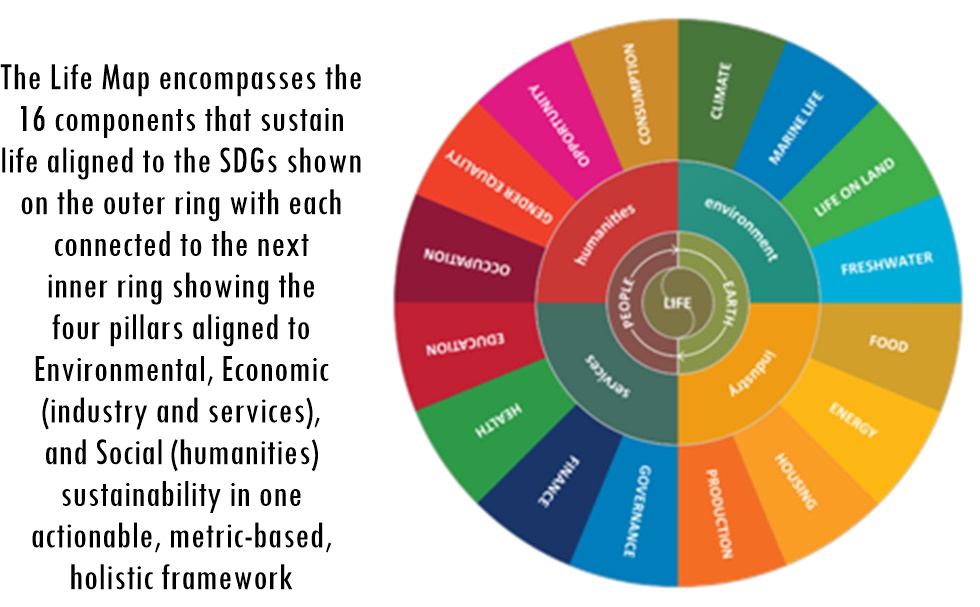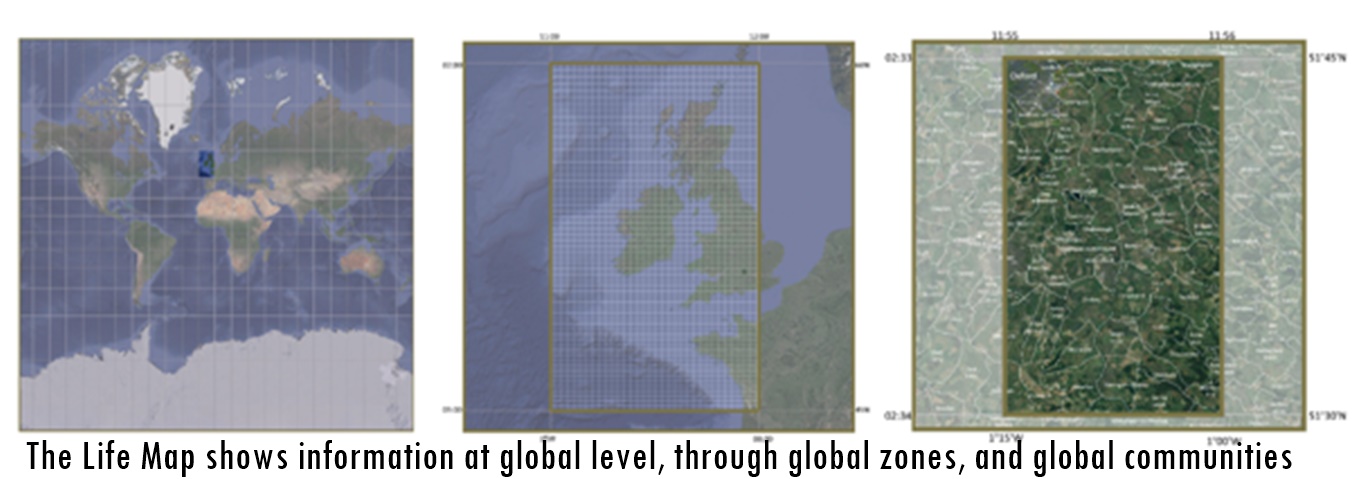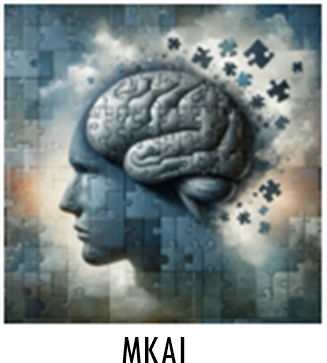JAMMU: Recent discussions surrounding the rapid evolution of technology and Artificial Intelligence (AI) have highlighted the unique challenges faced by today's youth.
A comprehensive questionnaire conducted by Ajmer Alam Wani Editor-in-Chief of JK Monitor (www.jkmonitor.org) has gathered insights from various experts, including Edward Darling (ED) Chief Executive of The Life Map Foundation (edward.darling@redlistrevival.org) (http://linkedin.com/in/edward-darling-52b540179), Errol Finkelstein (EF) Chief Finance Officer of Generation-C (thelifemap@elfdimensions.com), (https://www.linkedin.com/in/errolfinkelstein/), Eric Hansel (EH) Founder of the Scubaverse (e@scubaverse.xyz) (http://linkedin.com/in/eric-hansel-7a55831), Maria MacAndrew Chief Executive of MyZalu (macandrewm@gmail.com) (http://linkedin.com/in/maria-mac-andrew), Laura J Robertson (LR) Creator of Mythos Mind and Director of Zukunft Consulting (Laura.robertson@zukunftconsulting.com) ( http://linkedin.com/in/laurajaynerobertson).

Their responses shed light on the dramatic pace of innovation over the past few decades, emphasizing how technological advancements have transformed human interaction and information access.
The experts express concerns about the implications of AI on employment, privacy, and mental health, stressing the need for young people to navigate these complexities while leveraging the benefits of technology.
They advocate for a balanced approach that combines community support, ethical AI practices, and educational initiatives to empower youth in an increasingly digital world.
As organizations like MKAI work to promote responsible AI development aligned with sustainable goals, the dialogue continues to evolve, aiming to equip the next generation with the tools and knowledge necessary to thrive in an AI-driven future.
A questionnaire provided by Ajmer Alam Wani Editor-in-Chief of JK Monitor (www.jkmonitor.org), on technology, innovations, and Artificial Intelligence challenges for youth and their future and how to manage the impact of these challenges.
Responses from Edward Darling (The Life Map), Errol Finkelstein (Generation-C), Eric Hansel (The Scubaverse), Maria MacAndrew (MyZalu) and Laura Robertson (Mythos Mind). These answers are personal responses from the five of them involved with The Life Map (TLM) and MKAI and not made on behalf of The Life Map or MKAI.
- With over 30 years of experience observing and participating in technological advancements, how have you seen the pace and nature of innovation change over the decades?
The rate of change has been dramatic and continues to accelerate. From hand-written letters to fax machines, the first computers, wireless communications, the internet, satellite imagery and extraordinary processing skills. And now large language models, robotics, and the prospect of artificial general intelligence.
The rapid pace of change has caused problems as in the financial models involved in the 2008 financial crash. The change and spread of technology are not even or equitable with many parts of the world unable to access data and information.
- In what ways do you think the rapid development of Artificial Intelligence is uniquely challenging for today’s youth compared to previous technological shifts?
Technology is not challenge for young people to use; in fact they understand and connect with great ease and speed. Technology however has transformed human interaction by being the first alternative source of information outside known and trusted people and their community. This is also the first time that adults have not been able to control the content they access.
There is a feeling that they are aware that their digital footprint is being tracked but see that as been more of a benefit rather than a risk. The impact on their ability to learn rather than merely accessing information is a concern as is the effects on mental health.
- How can young people balance the potential benefits of AI with the risks it poses to employment, privacy, and mental health?
Above employment, privacy, and mental health is the problem that where people have access to technology there is usually the greatest disconnect with the fundamental tacit knowledge about sustaining life.
Technology is exaggerating features of society and everyone should be involved with understanding and shaping the benefits of AI to give agency and diversity. For employment the skills of younger people using technology will give them an advantage in this growing area while the jobs exist and it should be possible to plan better for the jobs needed to sustain society rather than aggregating wealth and valuable occupation (financial and non-financial) in a manner that leaves an increasing proportion valueless.
Developers of technology should bear the responsibility of keeping users safe but in that absence, awareness of risk and group support is crucial so people can learn without the extreme ramifications of failure where technology drifts from positive knowledge exchange to online pressure. Again, community support is vital along with leading a balanced lifestyle for physical and mental health.
- Could you elaborate on how MKAI is specifically addressing the challenges that AI presents to the younger generation?
MKAI draws together people with an interest in technology and AI and from a wide range of interests and background to address these challenges including for formal and informal education. Some of MKAI participants develop further themes both formally within sub-groups and informally like the five of us responding to this questionnaire.
MKAI is actively focusing on empowering the education section through knowledge and tools to harness and use AI effectively and responsibly. The discussions on ethical AI are aimed at enabling us all to navigate the complexities of the AI-driven world with informed perspectives and confidence.
- How do the Sustainable Life Indicators you designed help in understanding the balance between technological advancement and sustainable resource use?
The Sustainable Life Indicators are aligned to the UN Sustainable Development Goals (SDGs), but the modular components are presented as a holistic process.
The metrics associated with those components are presented in a standard format so that people from the resource management, policy, and education sectors can understand the consequences of choice, the implications of change, and maintain sustainable resource use.
The provision of the metrics would not be possible without technological advancement with the availability of satellite imagery and the ability to present and process data at a global scale to personal level.
Democratising data through the education and other sectors using The Life Map shows the use of technology in managing the metrics and improving outcomes. For informal knowledge enhancement, the use of digital technology and gamification has the potential to help in understanding sustainable resource use.

The Sustainable Life Indicators are aligned to the UN Sustainable Development Goals, but the modular components are presented as a holistic process. The Life Map encompasses the 16 components that sustain life aligned to the SDGs shown on the outer ring with each connected to the next inner ring showing the four pillars aligned to Environmental, Economic (industry and services), and Social (humanities) sustainability in one actionable, metric-based, holistic framework
- How does The Life Map integrate with current technological trends to support youth in navigating their careers and personal development?
The Life Map is designed to show people’s position at global, national and community level and help build understanding of our hierarchy of needs that underpin society including careers and personal development.
Using The Life Map trains people to access information about issues that affect them directly and learn about the issues that indirectly affect them too. As it develops, it should help people with life choices and act as an ongoing source of information throughout a lifetime.

- What role do educational initiatives play in preparing youth for the future of work in an AI-driven world?
The question and SDG 8 ‘Decent work and economic growth’ overlooks the fundamental need to prepare people for life and their lifetime occupations in sustaining themselves and their families, communities and nations.
Now with the human population consuming Earth’s resources at a faster rate than they can regenerate, we also need to ascertain how this can be achieved for our collective need and The Life Map is designed to help support amazing initiatives in this area.
Education initiatives play a huge role and it is important to ensure that providers have access to impartial information and that they do not inadvertently reinforce societal bias (see LR).
Blended learning processes covering knowledge and theory, skills and practice, and different technologies offer the education system access to real-world applications and the work involved (see EF). The use of digital material and gamification can extend the educational initiatives into informal and voluntary learning (see EH).
The ability to use real life projects, competitions or opportunities to contribute to wider events, and collaborations with industry partners would elevate initiatives (see MM).
- What steps can organizations like MKAI take to promote ethical AI practices that prioritize the well-being of future generations?
The first is to understand and promote ethical humanity so that AI can be used to enhance those ethics rather than deluding ourselves than we can create a set of values within AI and use those to benefit humanity. This is even more unrealistic with AI being driven for profit or power.
MKAI - and other groups, aim to facilitate and further promote conversations with diverse stakeholders and all need to have a system for showing how successful this is being achieved and what efforts are being made to fill gaps. Some of this group are involved with the UN Coalition for Digital Environmental Sustainability (CoDES) that includes work on addressing the digital divide that is excluding certain critical groups from these discussions. It was through CoDES that The Life Map was included as a global stakeholder in the UN Action Plan for a Sustainable Planet.
Some of the people leading on ethical practices, regulatory guidelines, and the developing law are involved in MKAI sharing their knowledge and experience with the group.
- How do you think the challenges posed by AI differ across various regions and cultures, and how can global organizations address these disparities?
AI is a continuing part of globalisation and whilst it is being driven for profit and power, it will exaggerate the problems facing humanity in reaching 2050 with less and less communities not affected by painful or terminal change.
The Life Map is designed to democratise data at global, national, and community level to avoid blanket globalisation and to protect religions and cultures focussed on sustaining life.
Global organisations should address technological and economic disparities, ensuring technology is designed, supported, and used equitably for everyone rather than the privileged few. The role of language is critical in understanding clear principles and underlaying nuances.
- How important is it for solutions to AI challenges to be interdisciplinary, involving not just technologists, but also sociologists, psychologists, and other experts?
Critical for AI - and for all sectors currently working in their silos, to collaborate and understand issues across multi-disciplines as none operate in a vacuum.
Hybrid roles will become increasingly important. Interdisciplinary working must focus on delivering resilient solutions and outcomes and not be an excuse for discussing lots and delivering little. Rapid feedback is required to assess effectiveness of actions regarding performance, risk, and control metrics.
- What strategies have you found most effective in engaging youth in discussions about AI and its impact on their futures?
Most of the work is designed to provide material for sustainability first and foremost and supported with information about the data source and the use of technology in managing further data collection. In the UK, there are discussions for using The Life Map material specifically within vocational training courses on AI and technology.
In the US, age appropriate discussions have been positively tested regarding the use of AI to identify marine life and generate environments. In Zambia however there has been collaboration between rural universities and schools for introductory education on AI (see MM).
- How can organizations like MKAI influence policy to ensure that AI development remains aligned with sustainable development goals (SDGs)?
Organizations like MKAI can significantly influence policy to ensure AI development aligns with sustainable development goals (SDGs) through a multi-faceted approach using forums, publishing insightful reports, and conducting in-depth interviews with industry experts to shape the discourse around AI and its implications for sustainable development.
Additionally, MKAI supports its community members in their initiatives to influence AI-related policies, ensuring that these efforts are aligned with global sustainability objectives.
There is frequently engagement with governmental leaders worldwide, offering expert guidance on complex issues such as data privacy, sovereignty, and regulation and through these strategic conversations, MKAI helps governments navigate the challenges of AI, advocating for policies that promote ethical and sustainable AI development. The development of an Ethics Compendium exploring the intersection of AI with critical areas of sustainability
- What is your vision for the future in terms of the relationship between technology, AI, and sustainable development, particularly concerning youth?
Technology is playing and will continue to play an increasing role in our understanding of issues, developing solutions, providing feedback loops about their impact, and accelerating knowledge transfer. Humans of all ages working seamlessly with technology to address the increasing intensity and complexity of issues.
- How important is AI literacy for the general public, and what role should educational institutions play in fostering this literacy?
AI literacy is crucial for the general public because AI is no longer just a futuristic concept—it's now an integral part of our daily lives and is reshaping the world around us.
AI is influencing existing roles and people in these roles need access to general life-long learning and specific training through mentorship, online courses, community workshops, and public lectures.
There should be opportunity to build a progress level of knowledge from a low base. The different education bodies need to be able to take a standard approach to learning or be able show the connection between different methodologies. The more people know, the greater the potential for their individual opportunities, for communities, for nations, and for humanity.
- What responsibility do corporations have in mitigating the adverse effects of AI on society, and how can they be held accountable?
For the broadly democratic, rule of law segment of countries, corporations have a prime responsibility to their shareholders, primarily by being well run and increasingly profitable. If AI can assist in this process it will be applied for maximum benefit of the corporation.
The corporations already run under SDG reporting, financial reporting regimes of the highest (but not infallible order) and the toughest judge of all their consumers, directly and through the ever-vigilant Media.
The current models putting shareholders returns – enhanced by AI, as the over-riding basis will continue until the rate of discounted risk, currently set so far in the future so it is negligible, changes and the short-term model with its adverse effects is seen to be destroying the business and the context within which it exists and flourishes.
Corporations specifically developing AI have an even greater responsibility to prevent adverse effects on shareholders, staff and consumers and the sustainable use of resources. Currently there appears to be no mechanism for attributing direct blame.
Org responsibility is also to ensure this is done in as risk averse way as possible in order that same organisations and institutions can provide psychological safety to their employees
- Can you share any innovative solutions or projects MKAI is currently working on to minimize the adverse effects of AI?
Most of the MKAI members are involved in optimising the use of AI and minimising adverse effects. Some of the MKAI members are involved with the UN Environment Programme Coalition for Digital Environmental Sustainability.
One of the MKAI members has been involved with the development of thecurrent UN ECE working party has drafted the regulatory cooperation and standardisation policy for AI.
- How can AI be leveraged to support mental health among youth, and what are the potential pitfalls to watch out for?
Society needs to be clear as to how to support mental health among youth and then ascertain how AI could help. There is potential for AI to be used for discussion or for virtual space to practise resilience strategies.
Finding a method to give rapid assessment of effectiveness of current and future support will be invaluable as spending time and money on something that is failing or makes matters worse is not acceptable but can occur.
- What skills do you believe will be most critical for youth to develop to thrive in an AI-dominated future?
Society needs to be clear about how to thrive (survive) in the future and then ascertain how AI could help. IT Skills, creativity, problem-solving, numeracy and mathematics, persistence, self-belief, process/organisational/societal understanding, communication (including with technology) and interpersonal skills, collaboration, awareness, and kindness.
- How can communities at the local level be mobilized to support young people in navigating the challenges posed by AI?
It is not just communities at the local level, a question for everybody at every level, for everyone – especially young people. The Life Map is designed to provide this connection at global level, nationally using constant zones, and at community level, to help address challenges. Many of the previous answers already cover this question.
- Reflecting on your career and experiences, what key lessons have you learned that you believe are crucial for the next generation to understand about technology and sustainability?
Community values are foundational. The well-being of the planet that sustains us must be at the forefront of technological development. Mindful and accurate communication, primarily between us and increasingly with technology, is critical. The importance of continuous learning cannot be overstated.
When times demand, do not be afraid to destroy the current and rapidly rebuild the future. Ensure the rights problems are addressed and solved using the right toolset.
Build a digital culture and invest in training, including for yourself. Consider security and trust upfront, not as an afterthought. Providing information so people can learn requires a different approach to educating people.
All these experts expressed their thanks to Ajmer Alam Wani, Editor-in-Chief at JK Monitor, for this opportunity to contribute and all are grateful to MKAI (https://mkai.org/about/join-the-mkai-community/) for bringing them together.

